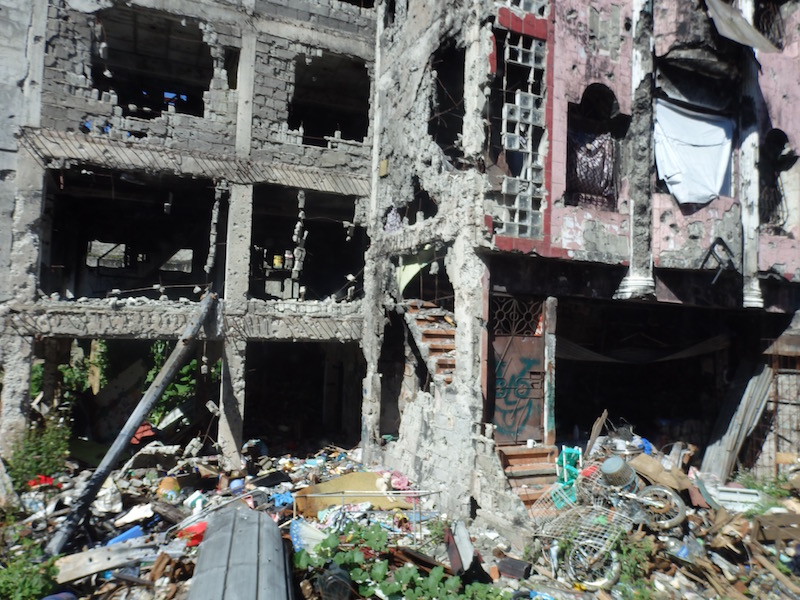DAVAO CITY (MindaNews / 14 March) – Some 10,000 hectares in Marawi City and neighboring municipalities in Lanao del Sur will be developed into abaca plantations to help residents recover from the five-month siege, Dante S. Delima, chief operating officer of Agri-Tech Integrated Services Cooperation, said.
 One of thousands of destroyed buildings n Marawi City’s ‘Ground Zero’ (now referred to as ‘most affected area’) taken on 20 February 2018, four months after President Rodrigo Duterte declared the city ‘liberated from the terrorist influence.” MindaNews photo by CAROLYN O. ARGUILLAS
One of thousands of destroyed buildings n Marawi City’s ‘Ground Zero’ (now referred to as ‘most affected area’) taken on 20 February 2018, four months after President Rodrigo Duterte declared the city ‘liberated from the terrorist influence.” MindaNews photo by CAROLYN O. ARGUILLAS
In an interview at the sidelines of “Usapang Kalakalan” organized by the Mindanao Sustainable Agrarian and Agriculture Development at the Apo View Hotel Davao Tuesday, Delima said they have discussed the program with the provincial agriculturist of Lanal del Sur.
He said the the group will set up first a nursery to propagate seedlings for an “intensive and a systematic” approach in the planting of abaca in 2019.
He said he and local officials of Marawi had met several times to plan on how to implement the project as part of the rehabilitation program for the displaced residents to provide them livelihood.
He said a farmer can grow 500 hills per hectare for intercropping and 1,000 hills for mono-cropping and can harvest thrice a year.
The abaca, which already grows in Marawi, can mature in two years with productive life of five to seven years, he said.
Data from the Philippine Statistics Authority showed that abaca production in the Autonomous Region in Muslim Mindanao reached 4,856.24 metric tons in 2016.
Delima said abaca production is labor-intensive and could generate jobs in the rural communities.
“Pagtan-aw sa maguuma sa produkto sa abaca mura bag kapoy labor intensive, mao na gusto nila motanom og mais, motanom og palay, motanom og high value crops (Farmers look at abaca as labor-intensive, that’s why they would resort to planting corn, rice, and high value crops),” he said.
He said abaca farming is suitable to the country’s topography, climate, and local culture.
He added some of the outputs from abaca are exported to Japan for their textile industry and as a component to their banknotes. Others reach Germany as materials for Kevlars, textile, and even materials for automobiles.
Delima said abaca production in the country is dwindling due to neglect as most of the farmers are focusing on high-value crops and the high labor requirement.
He said the Philippines is the only country growing abaca, but Latin American countries have started growing it with seedlings from here. (Antonio L. Colina IV/MindaNews)
